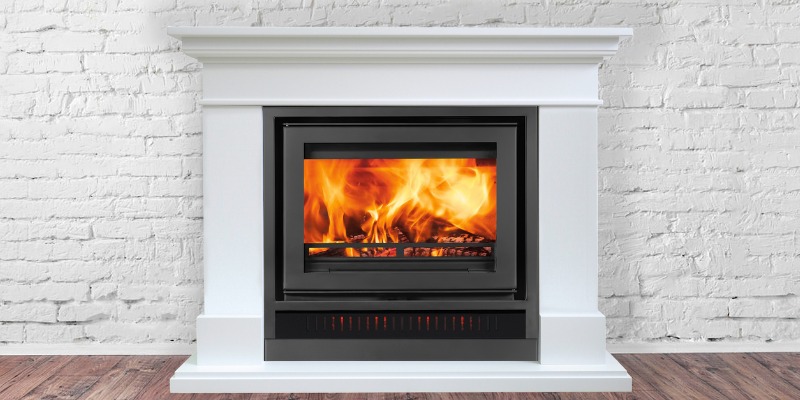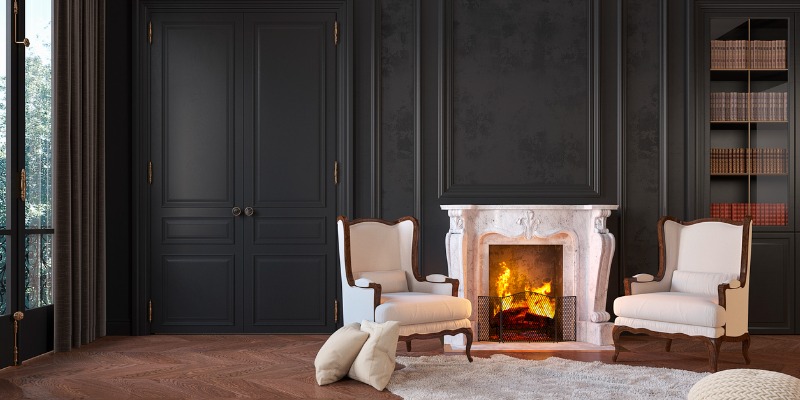
Fireplaces offer a warm glow and interesting focal point to enhance any room in the house. However, it can be hard to decide which type of fireplace is best for your home. Here, we compare the pros and cons of gas vs electric vs wood fireplaces to help you decide.
Gas vs Electric Fireplaces: Pros and Cons
One of the main benefits of electric fireplaces is that they are considered the cleanest type of fireplace available. They release zero pollutants into the air. Electric fireplace pros and cons include:
Pros
- They are safer for homes with children and pets as they remain cool to the touch
- They are very low maintenance
- The energy they produce is all converted into heat for your home
- They tend to be less expensive depending on the style you choose
Cons
- They won’t provide heat during a blackout like non-electric gas or wood fireplaces
- They don’t have as far of a reach for heating power like gas or wood fireplaces
Now for gas fireplaces. Although gas fireplaces release fewer pollutants than wood, they do still produce some emissions. Here are the pros and cons of a gas fireplace:
Pros
- Gas is less costly to heat than electric so they are more energy-efficient
- They offer backup heat in a blackout
- They provide a more “realistic” fire than electric
Cons
- They cost more upfront
- They often heat up a room too much
- They allow heat to escape from the home up the chimney
To learn more about which fireplace is best for your needs and budget, contact the professional team at Ultimate Home Comfort today.

Gas or Electric vs Wood Fireplaces: Pros and Cons
While many people mark wood as the gold standard of fireplaces, they do have their fair share of cons. Here are the pros and cons of wood-burning fireplaces:
Pros
- Nothing beats the warm glow and crackle of a wood fire
- They tend to increase home value
- They provide heat during a blackout
- They reduce power bills in the winter
- More affordable to operate than gas or electric
Cons
- They are high maintenance due to ash and soot buildup and creosote in the chimney
- Creosote poses a risk for housefires
- You need to keep wood stored which can attract pests when stored outdoors
- You need to prepare the wood before burning
- You need to order wood to keep the fireplace working
- Chimneys allow cold air to enter the home and warm air to be released
When compared to gas and electric fireplaces, although wood wins out for ambience and visual appeal, they tend to be the highest maintenance of the three.
The Bottom Line
When choosing a fireplace, you can consider three main features to decide which is the most important to you:
- Ambience, warmth, and flame: If you are all about the ambiance and glow of the fire, wood-burning fireplaces are the right choice for you.
- Low emissions and heat-free flame: If you are looking for the appeal of a fireplace but want to control the heat and produce zero emissions, the electric fireplace is the choice for you. They also offer a cool surface which is safer for families.
- Low maintenance, energy-efficient and backup heat: If you want to benefit from the heat of the fire without the worry of the maintenance, an energy-efficient gas fireplace offers warmth, a comparable flame to wood fireplaces and low maintenance.
Find the Fireplace You Need Today
No matter what type of fireplace you choose for your home, it helps to have the help of a professional technician for installation, inspections, maintenance, and cleaning. Contact our experts at Ultimate Home Comfort today.
